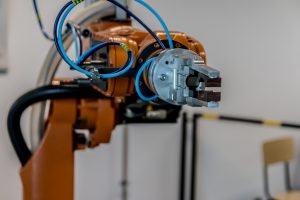CEO of Tesla, Elon Musk has stated that the future of AI could trigger World War III, President Vladimir Putin has described AI’s eventual leader as the “ruler of the world.” These statements are frighteningly accurate and should be regarded as a warning, as the amount of leverage AI will have on the job market and political hemisphere in even a few short years will be significant and cause for concern.

Sophia Bernazzani of HubSpot describes 10 jobs that automation will most likely replace, and 10 that are safe and not susceptible to automation any time soon. A clear pattern emerges among the jobs most at risk. They seem to low-skilled in nature and with tasks that are very deliberate and redundant; (Receptionists, Telemarketers, Couriers) Initially, the jobs that will be first replaced and are already being compromised are those requiring low skills, such as in manufacturing; which we are already seeing in many factories and tech companies such as Amazon, Apple among others.
However, it is becoming more and more evident that other jobs ones requiring more skill and education are in danger of being replaced to automation. Take for example Unilever; the creator of over 400 different brands, such as Dove, Axe, Vaseline, Becel, and many more. They recently launched a significant hiring experiment in which algorithms determined the suitability for different candidates. By replacing humans with logarithms not only are costs lower, but predictions can be more accurate. This is only the tip of the iceberg in terms of what is to come. The economic benefits in terms of operations seem to be endless with regard to automation; the obvious costs of salary are clear, however automation can also be in operation 24/7 of the time without the need of breaks, paid leave, benefits, etc. It is reported that up to 38 percent of all US jobs could be overthrown by 2030.
The consequences of job loss and automation extend beyond initial economic impact. Take for example the 2016 presidential election; prior to the November 8th election, President Trump campaigned on the premise of job loss to what he described as illegal immigration and foreign workers. However, it is found that many of the low skilled jobs were not lost to immigrants, but to automation. Even greater political extremes could be felt with the upcoming shift in automation.
It has become ever-increasingly clear that in a radically evolving job market, being equipped with the knowledge of what jobs are most at risk to automation is of the utmost significance. This is particularly true of university students who could be studying and paying thousands of dollars in tuition for a job that may no longer be needed by humans.
Word Count: 447
Media References
https://blog.hubspot.com/marketing/jobs-artificial-intelligence-will-replace
https://www.wsj.com/articles/in-unilevers-radical-hiring-experiment-resumes-are-out-algorithms-are-in-1498478400
http://www.businessinsider.com/when-robots-will-take-peoples-jobs-2017-6
All images found from free photo sharing site, pixabay.com
